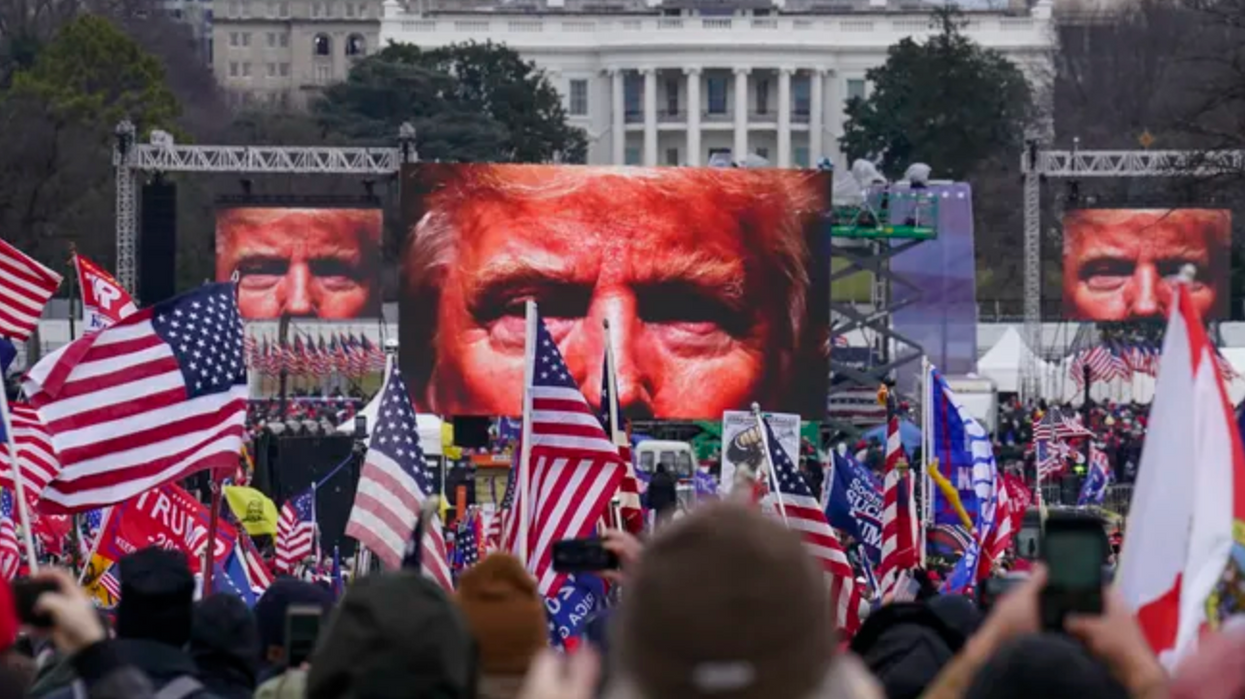Once Again, Trump Disrespects The Way We Do Things In This Country

Images of then-President Donald Trump on video screens at Ellipse rally on January 6, 2021
To help maintain my vigilant coverage of people who want to destroy our democracy, please consider becoming a paid subscriber.
You have no doubt seen an interview with attorneys after a trial on the front steps of a courthouse, when a prosecutor, or less frequently a defense lawyer, stands before the cameras and says some version of, “While we disagree with the jury’s verdict, we respect it.” You will never hear those words from the mouth of Donald Trump.
This week, Trump demonstrated his lack of respect for law and order once again by denouncing the Manhattan District Attorney as corrupt in advance of his expected indictment, and by inciting his followers to “PROTEST, TAKE OUR NATION BACK!”
Trump knows exactly what he means, and so do his followers. The last time he incited them in such a manner, with his tweet, “Big protest in D.C. on January 6. Be there, will be wild!”, he caused thousands of his supporters to assault the Capitol building and attack the police officers tasked with defending it. They did millions of dollars worth of damage to the building, not to mention preventing for a period of several hours the certification of the electoral votes by the House and the Senate.
We have a Constitutional system in this country, and Trump doesn’t believe in or respect even a tiny part of it. He has no respect for the office of the President. He showed that time and time again when he held that office and disgraced it. He has no respect for the Congress. He sent a mob to disrupt its most solemn duty, that of certifying the results of a presidential election. He has no respect for the judiciary. He demonstrated that by denouncing a federal judge because the judge was of a different ethnic background than he is. He has no respect for the electoral process, as he showed in 2016 by denouncing the presidential election as “rigged” before a single vote was counted, and again in 2020 when he refused to concede his loss and attempted over a period of two months to overturn the results of that election, often using illegal means.
By that time, Trump had filed and lost more than 60 lawsuits in battleground states where he had lost the election. He had pressured multiple state officials to help him overturn the election by certifying new slates of electors using their legislatures and filing them with the Congress after the deadline for the filing of electoral ballots had passed. And he solicited the advice of several advisors and aides who encouraged him to declare martial law and have the military conduct a new election – in effect, carrying out a military coup to remain in power.
When a candidate loses an election, the candidate is entitled to call for (and usually pay for) a recount of ballots, and the candidate is entitled to file lawsuits if irregularities were suspected of occurring. But when elections are finally and officially certified, losing candidates are expected to concede and move on. They can always run for office in the next election cycle and try again to win. That’s the way the system works.
When people are charged with crimes, there is a system for handling the legal requirements of indictment, arrest, booking, and appearing before a judge to have the charges read, plead not guilty or guilty, as the case may be, and ask for bail until the trial takes place. There are other steps in the process, of course, like filing motions for discovery, for reduction of charges, or even for dismissal before trial as a matter of law.
But none of the legal procedures established to deal with charging a person with having committed a crime and eventually bringing that person to trial before a jury of his or her peers involves inciting a protest by followers who have already shown their eagerness to use violence in exercising their support of the person who incites them, Donald Trump.
This is not the way we do things in this country. In a democracy, citizens have duties and responsibilities as well as rights, and leaders in a democracy have additional duties and responsibilities, the most grave of which is to follow and support the rule of law. When it is your duty to, in the words of the Constitution, “take care that the laws be faithfully executed,” then it is incumbent on you to lead by example and follow both the letter and the spirit of the law.
The right to incite violence is found nowhere in the Constitution of the United States, nor to my knowledge in the constitutions of the 50 states and territories. What is to be found in all those constitutions are the ways in which power is granted by the people and restrained by the law.
Every time I turn around, I hear that we can’t allow Trump’s behavior, and the behavior of the Republican Party, to be normalized. Here’s how you prevent that. You reject it. Here’s how you reject it. You get out and vote. Voting is the way individual citizens do what the Constitution says: grant and restrain power.
Our votes give us the power to make sure this democracy does not die.
Lucian K. Truscott IV, a graduate of West Point, has had a 50-year career as a journalist, novelist, and screenwriter. He has covered Watergate, the Stonewall riots, and wars in Lebanon, Iraq, and Afghanistan. He is also the author of five bestselling novels. You can subscribe to his daily columns at luciantruscott.substack.com and follow him on Twitter @LucianKTruscott and on Facebook at Lucian K. Truscott IV.
Please consider subscribing to Lucian Truscott Newsletter, from which this is reprinted with permission.








Trump Cabinet Nominee Withdraws Over (Sane) January 6 Comments